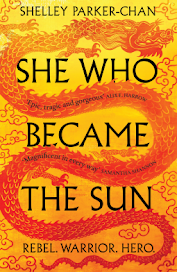Author: Shelley Parker-Chan
Publisher: Pan Macmillan, Mantle
Publication Date: July 22, 2021
Source: NetGalley
Rating: 4/5
About the book:
Mulan meets The Song of Achilles in Shelley Parker-Chan's She Who Became the Sun, a bold, queer, and lyrical reimagining of the rise of the founding emperor of the Ming Dynasty from an amazing new voice in literary fantasy.
To possess the Mandate of Heaven, the female monk Zhu will do anything
“I refuse to be nothing…”
In a famine-stricken village on a dusty yellow plain, two children are given two fates. A boy, greatness. A girl, nothingness…
In 1345, China lies under harsh Mongol rule. For the starving peasants of the Central Plains, greatness is something found only in stories. When the Zhu family’s eighth-born son, Zhu Chongba, is given a fate of greatness, everyone is mystified as to how it will come to pass. The fate of nothingness received by the family’s clever and capable second daughter, on the other hand, is only as expected.
When a bandit attack orphans the two children, though, it is Zhu Chongba who succumbs to despair and dies. Desperate to escape her own fated death, the girl uses her brother's identity to enter a monastery as a young male novice. There, propelled by her burning desire to survive, Zhu learns she is capable of doing whatever it takes, no matter how callous, to stay hidden from her fate.
After her sanctuary is destroyed for supporting the rebellion against Mongol rule, Zhu takes the chance to claim another future altogether: her brother's abandoned greatness.
Review:
Transporting 14th century China to a magical realist setting, combining elements of 'Mulan' and 'The Song of Achilles' is no doubt an ambitious project. Well, Shelley Parker-Chan has done it splendidly. It is not flawless and I would have preferred a much more conclusive ending, but that doesn't affect the immersive pleasure we are promised.
What I loved the most about the book is the narration. The first part is told entirely from the point of view of the girl who later poses as her brother Zhu Chongba. Her name is never revealed and remains a part of the desolated life she switched with her brother: unknown and unrecognised. Her perseverance and keen intelligence which even forces destiny to give her a helping hand glows brightly throughout finally taking into a physical form.
Once the other characters, especially Ouyang, start taking important roles, the narrative switches to multiple POVs. I thought this could be confusing in the beginning, but it did present the political situation rather well. Ouyang's side of the story was something to look forward to all the time.
Basic knowledge of Chinese history might give you a better understanding of the story (after all this is a reimagining of the life of Zhu Yuanzhang, the founding emperor of the Ming dynasty with genderqueer characters), though it is not necessary. My grasp of ancient Chinese history is akin to zero and so some random search on Red Turbans helped a great deal. But as I have said, this is not needed if you don't want to bother too much about the history behind it. As always, this is a universal story. If you are a believer of predestined fates, Zhu Chongba's story may convince you otherwise.
Meet the author:
Shelley Parker-Chan (she/they) is an Asian-Australian former diplomat and international development adviser who spent nearly a decade working on human rights, gender equality and LGBT rights in Southeast Asia. Named after the Romantic poet, she was raised on a steady diet of Greek myths, Arthurian legend and Chinese tales of suffering and tragic romance. Her writing owes more than a little to all three. In 2017 she was awarded an Otherwise (Tiptree) Fellowship for a work of speculative narrative that expands our understanding of gender.



I've heard a lot of good things from this book. I am so excited to read it!
ReplyDeleteLooking forward to reading this one myself!
ReplyDeleteI'm not a big lover of historical fiction from this era so I doubt it would be for me. It does sound good and I'm sure lots will love it. Glad you enjoyed it and great review.
ReplyDeleteThis is not for me. I am glad to see you enjoyed it.
ReplyDelete